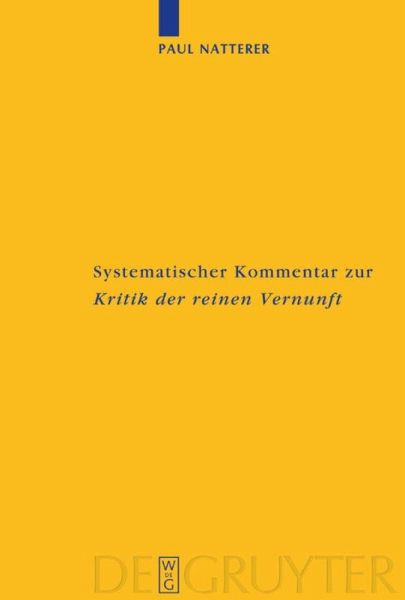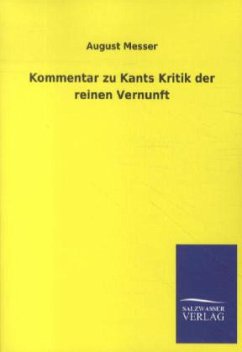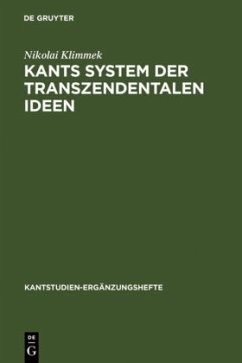
Systematischer Kommentar zur Kritik der reinen Vernunft
Interdisziplinäre Bilanz der Kantforschung seit 1945
Versandkostenfrei!
Versandfertig in 1-2 Wochen
239,95 €
inkl. MwSt.

PAYBACK Punkte
0 °P sammeln!
Paul Natterer's systematic commentary on the Critique of Pure Reason fills a long-standing gap in Kant scholarship. It is based on an analysis and evaluation of all the German and English-speaking literature published on the Critique since 1945.
The influence of Kantâ??s thought on present-day philosophy remains unbroken. The author sets himself the task of examining its power in detail. He does this with special reference to cognitive science and the philosophy of mind. The result is a systematic evaluation of the Critique of Pure Reason as a metatheory of present-day interdisciplinary research into cognition.
In this context, Natterer presents the first detailed analysis of the systemic positions of empirical psychology, formal logic and general metaphysics in the Kantian theory of cognition. In addition, from the perspective of the history of science he compares the positions put forward in the Critique of Pure Reason with the ancient, scholastic and modern traditions in which Kantâ??s thought can be situated.
Overviews, indexes and the structural division of the work into 36 compact chapters make it possible to access the comprehensive and complex material rapidly and methodically.
The influence of Kantâ??s thought on present-day philosophy remains unbroken. The author sets himself the task of examining its power in detail. He does this with special reference to cognitive science and the philosophy of mind. The result is a systematic evaluation of the Critique of Pure Reason as a metatheory of present-day interdisciplinary research into cognition.
In this context, Natterer presents the first detailed analysis of the systemic positions of empirical psychology, formal logic and general metaphysics in the Kantian theory of cognition. In addition, from the perspective of the history of science he compares the positions put forward in the Critique of Pure Reason with the ancient, scholastic and modern traditions in which Kantâ??s thought can be situated.
Overviews, indexes and the structural division of the work into 36 compact chapters make it possible to access the comprehensive and complex material rapidly and methodically.
Paul Natterers systematischer Kommentar zur Kritik der reinen Vernunft schließt eine in der Kant-Forschung seit langem bestehende Lücke. Er beruht auf der Auswertung der gesamten deutschen und angelsächsischen Literatur zur Kritik seit 1945.
Der Einfluß des Kantischen Denkens auf die Gegenwartsphilosophie ist ungebrochen. Der Autor macht es sich zur Aufgabe, dessen Leistungsfähigkeit im einzelnen zu überprüfen. Er tut dies insbesondere mit Blick auf die Kognitionswissenschaft und die Philosophie des Geistes: Entstanden ist somit eine systematische Evaluation der Kritik der reinen Vernunft als Metatheorie der interdisziplinären Kognitionsforschung der Gegenwart.
In diesem Zusammenhang legt Natterer erstmals eine detaillierte Aufarbeitung der Systemstellen von empirischer Psychologie, formaler Logik und allgemeiner Metaphysik in der Kantischen Theorie der Kognition vor. In wissenschaftshistorischer Perspektive leistet er darüber hinaus einen Abgleich der Kritik der reinen Vernunft mit den antiken, scholastischen und neuzeitlichen Traditionen, in denen das Kantische Denken sich verorten läßt.
Übersichten, Register und die Strukturierung in 36 kompakte Kapitel bieten einen schnellen methodischen Zugriff auf die umfangreiche und vielschichtige Materie.
Der Einfluß des Kantischen Denkens auf die Gegenwartsphilosophie ist ungebrochen. Der Autor macht es sich zur Aufgabe, dessen Leistungsfähigkeit im einzelnen zu überprüfen. Er tut dies insbesondere mit Blick auf die Kognitionswissenschaft und die Philosophie des Geistes: Entstanden ist somit eine systematische Evaluation der Kritik der reinen Vernunft als Metatheorie der interdisziplinären Kognitionsforschung der Gegenwart.
In diesem Zusammenhang legt Natterer erstmals eine detaillierte Aufarbeitung der Systemstellen von empirischer Psychologie, formaler Logik und allgemeiner Metaphysik in der Kantischen Theorie der Kognition vor. In wissenschaftshistorischer Perspektive leistet er darüber hinaus einen Abgleich der Kritik der reinen Vernunft mit den antiken, scholastischen und neuzeitlichen Traditionen, in denen das Kantische Denken sich verorten läßt.
Übersichten, Register und die Strukturierung in 36 kompakte Kapitel bieten einen schnellen methodischen Zugriff auf die umfangreiche und vielschichtige Materie.














